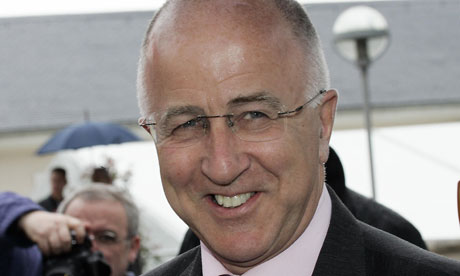FROM GUARDIAN.CO.UK
By opting out of an EU directive on sex slave trafficking, we continue to ignore the plight of vulnerable girls and women
A powerful three-part Channel 4 series on sex slave trafficking promised more than it delivered. Its timing was excellent: the three-hour film was shown in the week the Guardian revealed the government's decision to opt out of the new EU directive on sex slave trafficking. Twenty years ago a Tory government opted out of EU directives protecting workers. Today David Cameron and Nick Clegg are opting out of a directive aimed at protecting teenagers and young women from being trafficked into the UK's burgeoning brothel and massage parlour industry.
With luck the C4 documentary should alert public opinion to this depressing aspect of globalisation and the new patriarchalism which obliges young women to "have sex with 10 to 15 men a day against their will" as one detective constable told the film-makers. Shot and edited with consummate skill with a breathy linking commentary read by Helen Mirren in the style of Laurence Olivier declaiming the World at War script, the programme eschewed analysis in favour of showing police work in close-up detail. Two small west country forces co-operated fully with C4. The officers came over as decent, good men with female officers on the margin to help arrest women pimps and their victims.
But a huge amount of police time and work, including a trip to Thailand for Devon and Cornwall officers, results in a meagre haul. Minor Chinese and Thai pimps get prison sentences of between 12 and 18 months. At the same time there were court cases against Albanian and Slovakian pimps which resulted in longer prison sentences and details of the most brutal cruelty against trafficked women. There is no shortage of cases in all major cities, though it is not clear why the Devon and Cornwall or Gloucestershire chief constables agreed to co-operate with C4 rather than the Met where more dramatic examples of trafficking abound. But the documentary noted that the Home Office is winding down the Pentameter operations against trafficking. Mirren concluded: "You will find brothels and victims in every English town. Those individuals who use these brothels should think about what they are doing and stop using these services."
Thanks, Helen. Actually it is British men – not genderless "individuals" – who insist on a right to put money down and insert their penises into women's bodies. Serving this demand has led to massive increase in the supply of prostituted women. There is a sterile debate over numbers which C4 sensibly ignored. Getting the figures is impossible. The United Nations' International Labour Organisation says there are 2.45 million women trafficked into sex slavery worldwide. The Red Cross and other global outfits also insist that millions of women are traded. The idea Britain has only a few is laughable, despite a report in the Guardian by Nick Davies claiming that sex slave trafficking was hugely exaggerated. ACPO produced a report recently which talked of 4,000 trafficked women but British NGOs who work with the victims of sex slave trafficking criticised the methodology of ACPO's work and said the figure was much higher.
An organisation called the English Collective of Prostitutes, which has spokespersons but no details of membership or finances, is always available for Newsnight or the Guardian to pooh-pooh the problem of trafficking into or within Britain. Its solution is to legalise prostitution. Where this has been tried as in Nevada, the death and injury rate of prostituted women rises and students at universities in the US state believe it is impossible to rape a prostituted woman.
The C4 film avoided this debate or any effort to examine the ideology of male oppression that lies behind the extraordinary growth in sex trafficking. Detectives held up adverts in the Southampton Echo placed by one of the pimps in which "fresh" bodies were on offer for the delight of Southampton men. There was no challenge to the newspaper editors who are complicit in the sex slave industry by carrying adverts for sexual services.
After one raid, a detective talks to a punter and politely asks him to stay in touch. But there is no arrest even though a brave group of Labour women ministers and MPs changed the law to make it a crime to pay for sex with a victim who has been coerced in any way into working as a prostitute. Another detective described how a trafficked woman's "customer insisted on putting bits of metal into his condom causing her injury". So why wasn't the man arrested and charged? The C4 policemen donned armour and dramatically crashed their way into brothels. But no British male was arrested.
It is only by dealing with the demand side that any real progress will be made in reducing the inflow of trafficked women. The low-life, high-income foreign pimps arrested in the film have thousands ready to replace them because trafficking women is hugely profitable.
One of the last acts of Tony Blair's government was to sign and ratify the Council of Europe's convention on trafficking which I campaigned for in the Commons. The Home Office originally fought the convention, as Whitehall is today trying to derail the EU directive. Later under Gordon Brown the law was changed to make men open to naming and shaming if they paid for sex with a woman who had been trafficked or coerced into working in the sex trade. It is up to the police to apply the law and to editors to stop being accomplices of sex slavery by publishing the industry's adverts. It would be good if the liberal male media establishment could rethink their denigration of campaigners against sex slave trafficking.
The C4 documentary deserves loads of prizes. It was compelling television. But we need analysis, policy and police work to squeeze the demand side.




